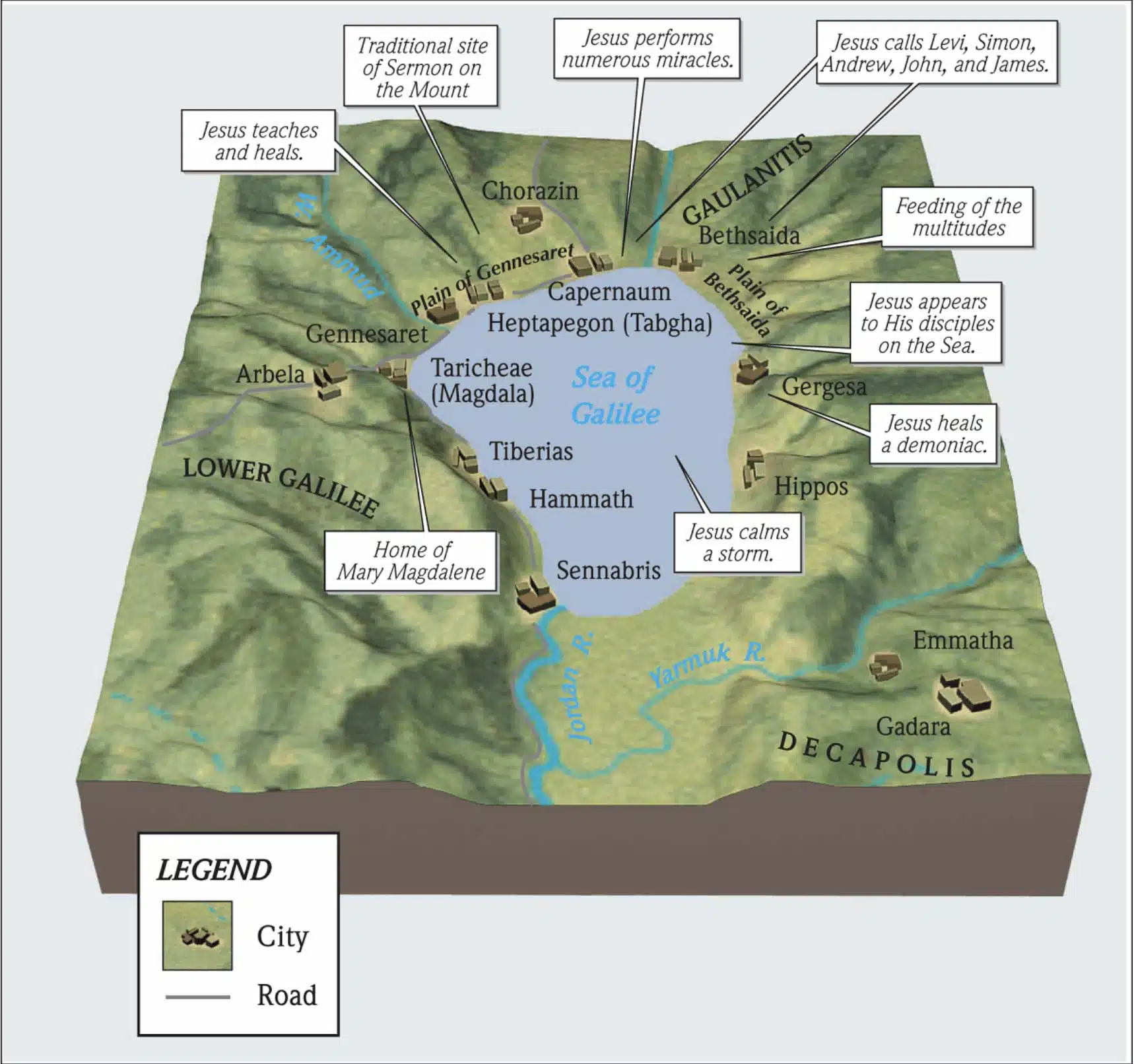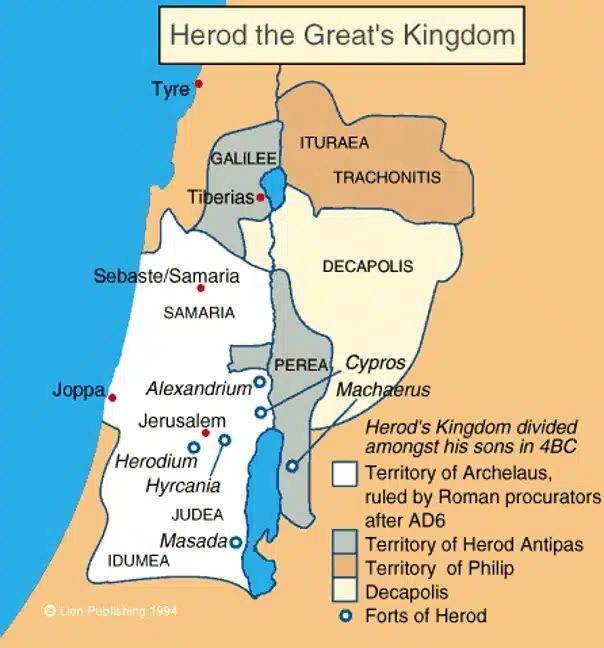Consistent with his straightforward writing style, Mark goes directly to the point by referencing two Old Testament prophecies about the forerunner who will precede and announce the coming Messiah.
The parallel gospel accounts for this passage are found in Matthew 3:3; 11:10; Luke 3:4-6; 7:18; and John 1:23.
After introducing the gospel of Jesus Christ, the Son of God, Mark jumps right into his gospel account by quoting two Old Testament Messianic prophecies. The first is from Malachi and the second is from Isaiah.
The first prophecy Mark cites is Behold, I send My messenger ahead of You, Who will prepare Your way. It comes from Malachi 3:1.
Malachi was the last prophet who spoke to Israel, and he wrote the final book of the Old Testament. Malachi is prophesying about John the Baptizer, the prophet who comes just before You—the Messiah (Jesus). It is interesting to note that John is the next prophet who comes to the Jews from God after Malachi—albeit roughly 400 years later.
Jesus personally shared this prophecy from Malachi and applied it to John the Baptizer when He taught about who John was (Matthew 11:7-19; Luke 7:24-28).
When we compare Mark’s citation we see that he modified Malachi’s language ever so slightly to underline the fact that Jesus is the Christ (Messiah).
Malachi 3:1 originally says: “Behold, I am sending My messenger, and he will clear a way before Me.”
The main change Mark makes comes at the end of each statement. Mark switches the pronouns from first person (Me/My) to second person (You/Your). Jesus says “You.” Malachi says “Me.”
What, if anything, are we to make of this difference? It would seem the OT quote says “I (God the Father) am sending a messenger to prepare a way for me (God)” while Mark says “I (God) am sending a messenger to prepare a way for You (the Son/Christ).” So, it seems Mark is making this application of the passage. It is clear that Mark is claiming that John is the messenger who fulfills this prophecy from Malachi 3:1.
The question then would be “Who then is the Christ?”
Mark answered this in the previous verse, the first verse of his gospel—Jesus is Messiah (Mark 1:1).
It is worth pointing out that Mark does not quote the rest of the prophecy found in Malachi 3. As noted earlier, Mark’s target audience are the Gentiles and he has made his point. There is no need to gild the lily and add verbiage that would be unfamiliar to his audience. This also continues the concise, staccato style of Peter (Mark’s source and Apostolic sponsor) of capturing the main point and moving on.
However, there is value in looking at the remainder of Malachi’s prophecy. Malachi goes on to talk about the Messiah’s fiery judgment.
“‘Behold, I am sending My messenger, and he will clear a way before Me. And the Lord, whom you are seeking, will suddenly come to His temple; and the messenger of the covenant, in whom you delight, behold, He is coming,’ says the Lord of armies. ‘But who can endure the day of His coming? And who can stand when He appears? For He is like a refiner’s fire, and like launderer’s soap. And He will sit as a smelter and purifier of silver, and He will purify the sons of Levi and refine them like gold and silver, so that they may present to the Lord offerings in righteousness.’”
(Malachi 3:1-3)
By omitting the latter part of Malachi’s prophecy, Mark was signaling a great mystery that was partially revealed through the life of Jesus. Namely, that Jesus was coming to earth in two advents. In the first advent, Jesus came to serve. In the second He will come to rule. In the first advent He did not come to judge the world (John 3:17). But He will come to judge the world when He returns again (Revelation 19:11).
By applying Malachi’s prophecy to John the Baptizer, Mark is making the explicit claim that John is this messenger sent ahead of Jesus, who is the Messiah.
Mark distinctly cites Malachi 3:1 as the prophet, whereas neither of the other two synoptic gospel writers (Matthew and Luke) include the citation in their versions. Recall how Matthew is writing to the Jewish nation. Many of the Jews would be aware of the context of Isaiah 40:3 and most likely be able to recite the entire passage from memory. Matthew and Luke would not need to use Malachi 3:1 to set the stage for Isaiah 40:3. By including Malachi 3:1, Mark provides context for his Gentile readers.
The second prophecy Mark cites is The voice of one crying in the wilderness, ‘Make ready the way of the Lord, Make His paths straight.’ It comes from Isaiah 40:3.
This prophecy is also about John the Baptizer who, as we shall soon see, began calling people to repentance in preparation for the Messiah’s coming. John called people to straighten out their crooked lives. John also lived and largely preached in the wilderness of Judea (Mark 1:5).
Mark identifies John as the voice of one crying in the wilderness. This voice announces the coming of the Lord and urges everyone to make ready and prepare the way.
By citing this prophecy, Mark identifies John the Baptizer as the fulfillment of the prophecy in Isaiah 40:3, offering it as proof that Jesus is the Kingly Messiah. John, according to Mark (as well as Matthew, Luke, and John) is the voice of one crying in the wilderness. He is the prophetic herald who warns everyone to Make ready the way of the LORD, Make His paths straight!
Mark only quotes the first lines of this prophecy. Remember: Mark’s target audience are the Gentiles, he has made his point and he moves on. However, just as there was value in looking at the remainder of Malachi’s prophecy, so to, there is value in looking further into Isaiah’s prophecy that continues:
“A voice is calling,
‘Clear the way for the Lord in the wilderness;
Make smooth in the desert a highway for our God.
‘Let every valley be lifted up,
And every mountain and hill be made low;
And let the rough ground become a plain,
And the rugged terrain a broad valley;
Then the glory of the Lord will be revealed,
And all flesh will see it together;
For the mouth of the Lord has spoken.’”
(Isaiah 40:3-5)
Isaiah’s message is similar to John’s words from the Matthew 3:2: “Repent, for the Kingdom of Heaven is at hand,” and in Mark 1:4: “John the Baptist appeared in the wilderness preaching a baptism of repentance for the forgiveness of sin.”
Both Isaiah and John announce a divine arrival:
“Clear the way for the Lord”
“The Kingdom of Heaven is at hand.”
Both give a call to action and change:
“Clear the way.”
“Make smooth.”
“Repent.”
Both allude to an upheaval of the status quo. In particular, the political status quo is about to be capsized:
“Let every valley be lifted up,
And every mountain and hill be made low;
And let the rough ground become a plain,
And the rugged terrain a broad valley.”
“The Kingdom of Heaven is at hand.”
The fact that this forerunner of the Messiah is literally in the wilderness of Judea when he proclaims his message further associates him with Isaiah’s prophecy. In the next verses Mark will identify this forerunner as John the Baptizer and begin describing his ministry (Mark 1:4-6).
Biblical Text
2 As it is written in Isaiah the prophet:
“Behold, I send My messenger ahead of You,
Who will prepare Your way;
3 The voice of one crying in the wilderness,
‘Make ready the way of the Lord,
Make His paths straight.’”
Check out our other commentaries:
-
Habakkuk 3:1–2 meaning
Habakkuk asks God to have compassion on Judah amid their exile so that they can experience spiritual revival and restoration....... -
Numbers 6:13-20 meaning
Completion of the Nazirite Vow...... -
Genesis 1:1 meaning
The Bible begins with God creating the entire universe....... -
Deuteronomy 7:7-11 meaning
God’s election of Israel was a free gift, which was based upon His gracious love for them and His faithfulness to their forefathers. ...... -
Exodus 33:18-23 meaning
Moses needed a visible sign that would confirm the LORD’s promised presence, so he asked Him to make Himself visible to him. The LORD answered......




